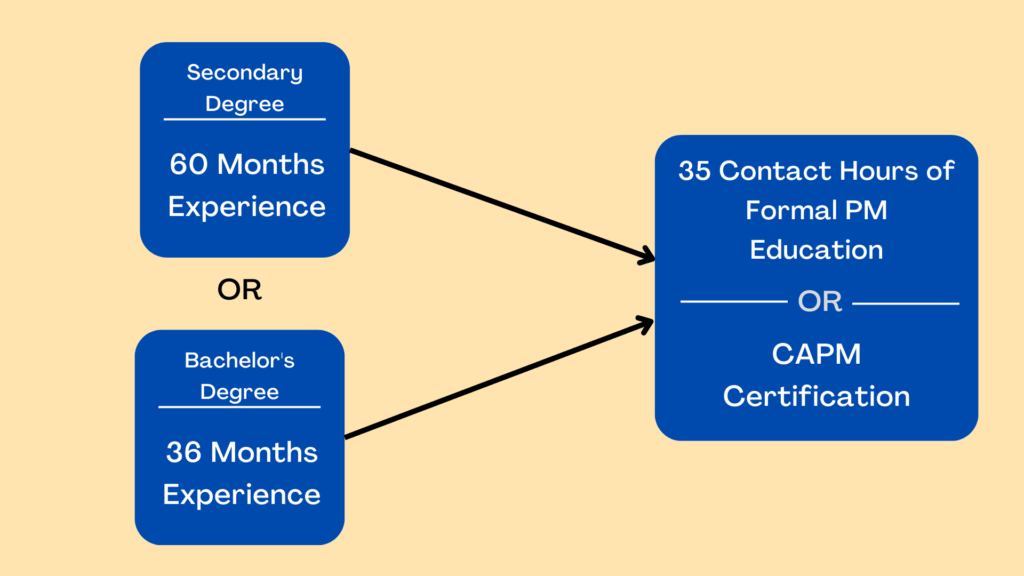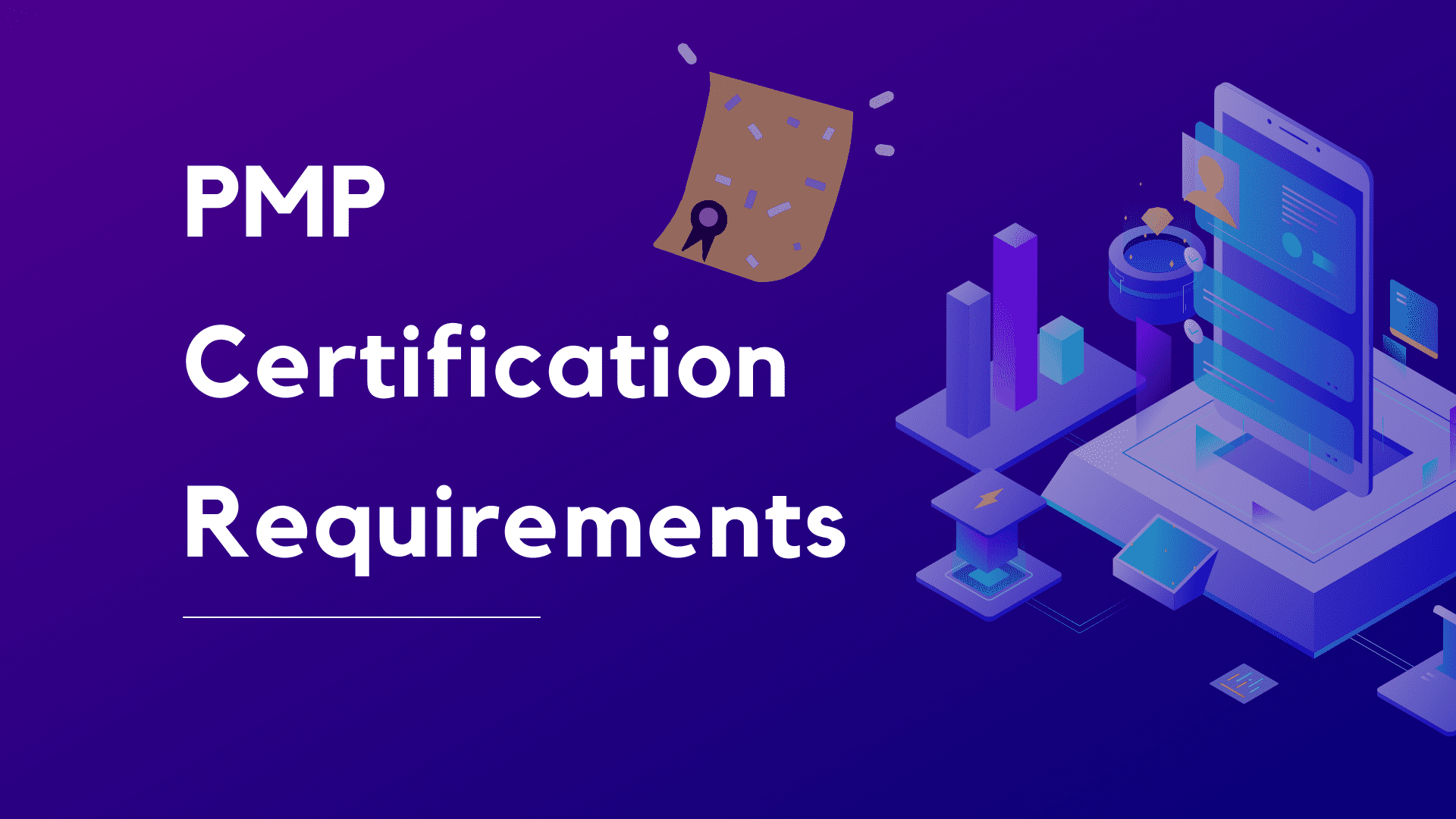Obtaining the Project Management Professional (PMP) certification is not a simple task, yet, achieving this goal can be a significant turning point in your career as a project manager. It will position you as a more suitable candidate for project manager roles, increasing the likelihood that you will receive a higher income.
You will have a greater knowledge base, and any information gaps that you currently have will be filled.
To make you understand the process easier, this post will provide detailed information on PMP certification requirements, the PMP certification process, and other FAQs.
After reading this post, you will understand the PMP certification requirements and the process needed to obtain it.
PMP Certification Eligibility Requirements

The Project Management Institute (PMI), USA, has defined some requirements to apply for the PMP certification exam. They mandated schooling, prior experience leading and directing a project as part of project management, and completion of formal training in project management education as prerequisites for employment.
After you have fulfilled these three prerequisites, you are eligible to apply for the PMP certification exam.
Be aware that the experience you submit must have been gained within the past eight years and must not overlap with any other experience you have submitted. In addition, if you have worked on two projects simultaneously, you should only count the experience you gained from one of them.
The project management experience depends on the education qualification of the applicant and is as follows:
High School Diploma, Associate’s Degree, or Global Equivalent
- 60 months of experience leading projects within the past eight years
- 35 hours of project management education/training or CAPM® certification
Bachelor’s Degree (Four-year Degree) or Global Equivalent
- 36 months of experience leading projects within the past eight years
- 35 hours of project management education/training or CAPM® certification
PMP Certification Exam Application Process
Project Management Institute (PMI), USA, administers the PMP exam application process.
The application procedure for the PMP certification exam is lengthy but rather basic. Go to the PMI website (pmi.org) and create a free account if you think you meet all of the prerequisites for the PMP certification. Complete the application for the PMP exam and then send it in. When your application has been accepted by the PMI, you can schedule the exam, make the payment, and visit the Pearson VUE website to schedule the exam.
After scheduling your exam, you can start preparing and ensure that you cover all concepts mentioned in the latest PMP exam content outline because the PMP exam is based on it.
Note that you can attempt the PMP exam at the center or home. The exam duration is 230 minutes, and it includes 180 questions.
The steps for the PMP certification exam application process are as follows:
#1. Register with the Project Management Institute
You can sign up as either a free member or a paid member. You will save a significant amount of money on the price of the PMP certification exam if you pay for a paid membership, which will cost you $139. The PMP exam fee for non-members is $555 and for PMI members is $405.
#2. Attend the Training to Earn 35 Contact Hours Requirements
This is a requirement to apply for the PMP certification. Attend the PMP training if you satisfy the other two conditions. Note that the contact hours never expire, so don’t worry about the exam date and get the training.
#3. Apply for the PMP Exam
To apply for membership, please go to PMI.org, fill out the application form, and submit it. If your application is accepted, you can move through with the payment. Take note that PMI will select you for an audit at this stage in the process. You will have to provide them with copies of your education, experience, and training certificates if selected.
Your application will be approved by PMI if everything is in order, and after that, you will be able to pay the money for the exam.
#4. Schedule the Exam
After the application approves, you have one year to pass the PMP exam with three attempts. If you don’t pass or fail in all attempts, you cannot apply for the exam for one year.
You can schedule the exam after three months, as this time is enough for the PMP exam preparation. Lesser than three months will burn you, and more than this duration can cause you to lose interest in the exam.
To schedule the exam, visit Pearson VUE.
#5. Attempt the Exam
If you have chosen to take the exam at a centralized location, you must get there at least half an hour early to complete the necessary paperwork. The PMP exam has 180 questions, and the duration is 230 minutes. Because the exam has no negative marking, you must answer all the questions. If you don’t know the answer, choose the answer that seems to be the most likely.
If you plan to take the exam at home, you should check the computer’s condition, exit all other applications and notifications, and take precautions to ensure that you will not be disturbed while working on the test. Make sure the door is locked, and if you are working on a desktop computer, make sure it is connected to a power backup so that it will not turn off if the electricity goes out for whatever reason.
#6. PMP Exam Result
You will know the PMP exam result as soon as you submit the answers. You can immediately use the “PMP” title if you have passed the exam.
The Pearson VUE staff will give you a printout of your result, and you can leave.
It takes around one week for your name to appear on the PMI registry, and you will get the hard copy of your certificate within eight weeks.
If you have failed, you have two more attempts to pass the PMP exam within one year of your eligibility period.
PMP Certification Process Resources
You can refer to the following articles on PMP certification:
- How to Prepare for the PMP Exam?
- The Cost of the PMP certification Exam.
- How to Get PMP Training Online?
- Best Resources for the PMP exam Preparation
- How to Avoid PMP Audit?
You can refer to the following additional resources on the PMI website:
- PMP Handbook
- PMP Exam Content Outline
- PMP FAQs
Frequently Asked Question
#1. Do I Need to be a Project Manager to Apply for the PMP exam?
No, the project manager title is not required, but you should have experience in leading and directing the project.
#2. What is the PMP exam Application Fee?
For non-PMI members, the PMP exam fee is 555 USD, and for PMI members, it is 405 USD.
#3. Can I Earn 35 Contact Hours for Free?
You certainly can, but bear in mind that it will be incredibly challenging. You will need to tally the number of hours spent on project management education across your degree program and the other course. You are good to go if it satisfies the conditions set forth by the PMI. However, it is difficult to accumulate all 35 hours in this manner.
You can join a low-cost online PMP training course to earn 35 contact hours.
#4. Is the PMP Certification Valid forever?
No. The PMP certification is valid for three years. To renew the PMP certification for a further three years, you will need to earn 60 PDSs in three years and report to PMI. Once you do it and pay the renewal fee, PMI will renew your certificate for another three years.
#5. How Many PDUs are required to Renew the PMP Certification?
You will need 60 PDUs in three years to renew the PMP certification. However, note that if you earn extra PDUs in the last year, you can move up to 20 PDUs to the next cycle. For example. If you earn 70 PDUS, you can move 10 PDUs in the next cycle, provided these ten PDUs were earned in the third year.
#6. What is the Cost of Renewing the PMP Certification?
The cost of PMP certification is $150 do non-PMI members, and for PMI members, it is $60.
Summary
You must fulfill three PMP certification requirements to apply for the PMP exam. These prerequisites include your education, experience, and 35 contact hours of formal education in project management.
